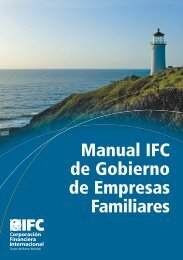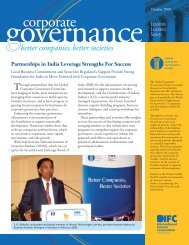SME Finance Policy Guide
SME Finance Policy Guide
SME Finance Policy Guide
Create successful ePaper yourself
Turn your PDF publications into a flip-book with our unique Google optimized e-Paper software.
G-20 <strong>SME</strong> FINANCE POLICY GUIDE<br />
13<br />
<strong>SME</strong> Lending Targets in the United Kingdom<br />
In February 2011, the Merlin Agreement was established between the UK Government and the major UK banks – specifically<br />
Barclays, HSBC, LBG and RBS, and Santander - recognizing their responsibility to support economic recovery<br />
in the United Kingdom. The agreement sets lending targets of around £190 billion this year, including £76 billion<br />
to small firms. The Bank of England will monitor whether the loans targets are being met. This is part of a wider<br />
agreement that also includes curbs on bonuses and requirements to disclose salaries, and has been negotiated as a<br />
result of the banking sector bailout that occurred in the context of the crisis.<br />
The banks are also committed to implementing the recommendations of the UK Business <strong>Finance</strong> Taskforce (which<br />
also comprises Standard Chartered), in particular the following;<br />
i) Support a network of mentors from the banks, attached to existing mentoring organizations, to deliver a free finance<br />
service to small and medium sized businesses across the United Kingdom;<br />
ii) Improve service levels to micro enterprises through a new lending code;<br />
iii) Publish lending principles that clearly set out the minimum standards for medium-sized and larger businesses;<br />
iv) Establish transparent appeals processes for when loan applications are declined, with processes independently<br />
monitored by a senior independent reviewer, who will publish the results of their review;<br />
v) Initiate a pre re-financing dialogue 12 months ahead of any term loan coming to an end;<br />
vi) Establish and invest in a new £1.5 billion Business Growth Fund (built over a number of years);<br />
vii) Support the Enterprise <strong>Finance</strong> Guarantee Scheme;<br />
viii) Help mid-sized businesses access syndicated debt markets;<br />
ix) Improve access to trade finance;<br />
x) Signpost alternative sources of finance;<br />
xi) Fund and publish a regular independent survey on business finance demand and lending supply;<br />
xii) Enhance the cross-industry lending dataset by broadening the statistics on (among other things) lending to deprived<br />
areas and national and regional data on the provision of bank support to business start-ups<br />
xiii) Hold regional outreach events throughout 2011;<br />
xiv) Improve customer information including a review of literature and other materials (e.g., loan applications); and<br />
xv) Establish a Business <strong>Finance</strong> Round Table.<br />
Source: http://www.hm-treasury.gov.uk/d/bank_agreement_090211.pdf<br />
data availability and investing in regular collection and<br />
dissemination of reliable financial inclusion data. The<br />
focus of these data-related investments will vary by<br />
country, but overall recommended measures to<br />
improve the current data landscape on <strong>SME</strong> finance are<br />
the following:<br />
• Harmonize the definitions of the concepts to be<br />
measured to ensure comparability across countries<br />
and over time, to devise development strategies, and<br />
to adapt or design informed policies. This is especially<br />
important for data and measurement of access<br />
to finance by <strong>SME</strong>s and women-owned <strong>SME</strong>s. 12<br />
• Standardize data collection and indicator computation.<br />
The use of international concepts, classifications<br />
and methods promotes the transparency,<br />
consistency and efficiency of statistical systems.<br />
• Build or improve national statistical capacity to<br />
improve data availability and quality.<br />
• Improve data availability and quality with a focus on<br />
missing indicators including barriers to access, usage<br />
by enterprises, role of informal providers, etc.<br />
• Build consistent and reliable data sources for access<br />
to finance by agricultural <strong>SME</strong>s. 13<br />
• Ensure open data access.<br />
12 Also see “Strengthening Access to <strong>Finance</strong> for Women-Owned <strong>SME</strong>s in Developing Countries: Executive Summary for GPFI Report”<br />
prepared by IFC for the GPFI <strong>SME</strong> <strong>Finance</strong> Sub-group, August 2011.<br />
13 Source: “<strong>Policy</strong> Paper on Agricultural <strong>Finance</strong> for Small and Medium-Sized Enterprises: Executive Summary for GPFI Report” prepared<br />
by IFC for the GPFI <strong>SME</strong> <strong>Finance</strong> Sub-group (August 2011).



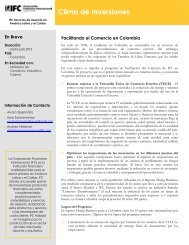
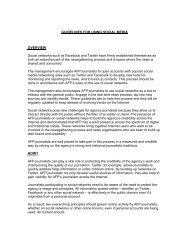
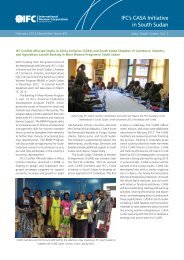
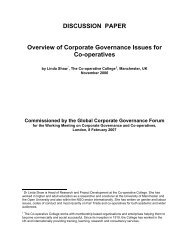
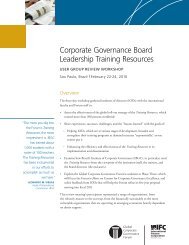

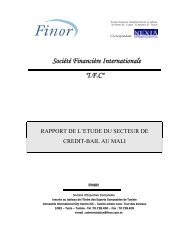

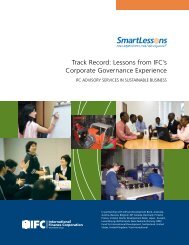
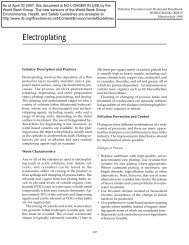

![Print a two-page fact sheet on this project [PDF] - IFC](https://img.yumpu.com/43449799/1/190x245/print-a-two-page-fact-sheet-on-this-project-pdf-ifc.jpg?quality=85)
